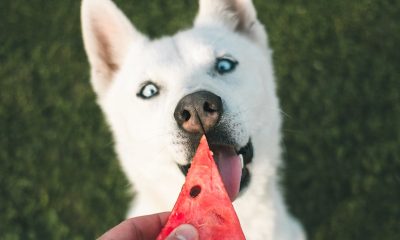Nutrition & Supplements
The Role of Prebiotics in Your Dog’s Gut Health

You might be skeptical about adding prebiotics to your dog’s diet, but trust us, it’s worth it.
Prebiotics play a crucial role in maintaining your furry friend’s gut health. They support a balanced gut microbiome, aid in digestion, boost the immune system, and reduce gastrointestinal issues.
Plus, prebiotics promote nutrient absorption and overall well-being.
So, if you want to serve your dog the best, incorporating prebiotics into their diet is a natural and effective way to do it.
The Importance of Prebiotics in Your Dog’s Gut Health
You should prioritize adding prebiotics to your dog’s diet for optimal gut health. Prebiotics are beneficial substances found in certain foods that promote the growth of healthy bacteria in your dog’s gut flora. By incorporating prebiotics into your dog’s diet, you’re taking an important step towards improving their overall well-being.
One of the key benefits of prebiotics in dog food is their ability to support a healthy digestive system. Prebiotics act as food for the beneficial bacteria in your dog’s gut, helping them thrive and maintain a balanced gut flora. This can improve digestion, nutrient absorption, and prevent gastrointestinal issues such as diarrhea or constipation.
Additionally, prebiotics have been shown to boost the immune system in dogs. A healthy gut flora plays a crucial role in supporting a strong immune response, as it helps eliminate harmful bacteria and pathogens. By providing your dog with prebiotics, you’re helping to strengthen their immune system and protect them from infections and diseases.
Furthermore, prebiotics can contribute to better nutrient utilization in dogs. By promoting the growth of beneficial bacteria, prebiotics enhance the breakdown and absorption of essential nutrients from their food. This means that your dog will be able to extract more nutrients from their diet, leading to improved overall health and vitality.
How Prebiotics Support a Balanced Gut Microbiome in Dogs
Prebiotics play a crucial role in supporting a balanced gut microbiome in your dog. By enhancing the digestive system, prebiotics help improve nutrient absorption and promote a healthier gut environment.
Additionally, prebiotics also boost the immune system, helping your dog stay healthy and better equipped to fight off infections and diseases.
Enhancing Digestive System
An enhanced digestive system is crucial for maintaining a healthy gut microbiome in dogs. By improving nutrient absorption, you can support your dog’s overall well-being.
A healthy gut microbiome is essential for proper digestion and nutrient utilization. Prebiotics play a vital role in enhancing your dog’s digestive system. They’re non-digestible fibers that promote the growth of beneficial bacteria in the gut. These bacteria help break down food, absorb nutrients, and support a healthy immune system.
By incorporating prebiotics into your dog’s diet, you can improve their digestion, increase nutrient absorption, and ultimately enhance their overall well-being.
Boosting Immune System
Boosting your dog’s immune system is essential for promoting a balanced gut microbiome. A healthy immune system not only helps prevent illnesses but also plays a crucial role in boosting energy levels and preventing allergies in your furry friend. One way to support your dog’s immune system is by incorporating prebiotics into their diet. Prebiotics are non-digestible fibers that stimulate the growth of beneficial bacteria in the gut. By nourishing the good bacteria, prebiotics help maintain a robust immune system.
To highlight the benefits of prebiotics, here is a table showcasing their positive effects on your dog’s health:
| Benefits of Prebiotics |
|---|
| Boosts immune system |
| Enhances gut health |
| Prevents allergies |
The Role of Prebiotics in Enhancing Digestion in Dogs
You should consider incorporating two specific types of dietary fibers to improve your dog’s digestion. Prebiotics play a crucial role in promoting a healthy gut and overall wellbeing for your furry friend. These natural fibers aren’t only beneficial for weight management but also for maintaining good dental health.
Firstly, let’s talk about prebiotics and weight management. Incorporating prebiotics into your dog’s diet can help them maintain a healthy weight. Prebiotics act as food for the beneficial bacteria in the gut, promoting their growth and activity. This, in turn, helps in the breakdown of complex carbohydrates and the absorption of nutrients, preventing weight gain. By including prebiotics in your dog’s diet, you can support their digestive health and help them maintain a healthy weight.
Secondly, prebiotics also play a role in dental health. These fibers stimulate the growth of beneficial bacteria, which helps in preventing the growth of harmful bacteria in the mouth. This can reduce the risk of dental diseases such as plaque and tartar buildup, gum inflammation, and bad breath. By incorporating prebiotics into your dog’s diet, you can improve their dental health and keep their teeth and gums strong and healthy.
Prebiotics as a Natural Way to Boost Your Dog’s Immune System
By incorporating prebiotics into your dog’s diet, you can naturally boost their immune system and improve their overall health. Prebiotics are a type of dietary fiber that promote the growth of beneficial bacteria in your dog’s gut, ultimately boosting gut health and providing natural immune support.
When your dog’s gut is healthy, their immune system is better equipped to fight off infections and diseases. Prebiotics act as food for the good bacteria in the gut, helping them thrive and maintain a balanced microbiome. This is crucial because approximately 70% of your dog’s immune system resides in their gut.
Adding prebiotics to your dog’s diet is as simple as incorporating certain foods or supplements. Ingredients like chicory root, garlic, bananas, and oats are rich sources of prebiotics. You can also find prebiotic supplements specifically formulated for dogs. Always consult with your veterinarian before making any dietary changes to ensure it’s appropriate for your dog’s specific needs.
By boosting your dog’s gut health and providing natural immune support through prebiotics, you’re taking a proactive step towards keeping them healthy and happy. A healthy immune system means fewer visits to the vet, a stronger defense against illnesses, and an overall improved quality of life for your furry friend.
The Impact of Prebiotics on Reducing Gastrointestinal Issues in Dogs
Are you tired of your dog experiencing frequent gastrointestinal issues?
Well, there’s good news! Prebiotics can have a significant impact on reducing these problems.
Prebiotics for Digestive Health
If you want to improve your dog’s digestive health, incorporating prebiotics into their diet can have a significant impact on reducing gastrointestinal issues. Prebiotics are natural, fiber-rich substances that promote the growth of beneficial bacteria in your dog’s gut.
Here are three reasons why prebiotics are essential for your dog’s digestive health:
- Prebiotics and Weight Management: Prebiotics help regulate your dog’s appetite and promote healthy weight management. They can increase satiety, which prevents overeating and weight gain.
- Prebiotics and Dental Health: Did you know that prebiotics can also improve your dog’s dental health? They reduce the growth of harmful bacteria in the mouth, which can lead to plaque and tartar buildup. By incorporating prebiotics into their diet, you can support healthy teeth and gums.
- Improved Nutrient Absorption: Prebiotics enhance your dog’s ability to absorb essential nutrients from their food. This ensures that they’re getting the maximum nutritional value from their meals, leading to overall better health and vitality.
Reducing GI Problems
To effectively reduce GI problems, try incorporating prebiotics into your dog’s diet and observe the positive impact they have on their gastrointestinal health.
Prebiotics are non-digestible fibers that serve as food for the beneficial bacteria in your dog’s gut. By promoting the growth of these good bacteria, prebiotics help to maintain a healthy balance of gut flora, which is essential for proper digestion and overall well-being.
One of the key benefits of prebiotics is their ability to reduce inflammation in the gut. Inflammation can lead to a variety of GI problems, including diarrhea, constipation, and irritable bowel syndrome. By reducing inflammation, prebiotics help to alleviate these symptoms and improve your dog’s overall digestive health.
Incorporating prebiotics into your dog’s diet is easy. Many high-quality dog foods contain prebiotic ingredients such as chicory root, oats, and flaxseed. Alternatively, you can also find prebiotic supplements specifically designed for dogs. It’s important to introduce prebiotics gradually and monitor your dog’s response to ensure optimal results.
To summarize, incorporating prebiotics into your dog’s diet can help reduce GI problems by promoting gut flora balance and reducing inflammation. By taking this simple step, you can improve your dog’s gastrointestinal health and ensure their overall well-being.
Prebiotics and Their Role in Promoting Nutrient Absorption in Dogs
Feed your dog prebiotics to enhance their nutrient absorption and overall health. Prebiotics play a crucial role in maintaining your furry friend’s gut health. Here are a few key benefits of incorporating prebiotics into your dog’s diet:
- Improved Nutrient Absorption: Prebiotics act as a food source for the good bacteria in your dog’s gut, promoting their growth and activity. This, in turn, enhances the absorption of essential nutrients from their food, ensuring they receive maximum nourishment.
- Weight Management: Prebiotics can help regulate your dog’s weight by promoting a healthy balance of gut bacteria. Studies have shown that prebiotics can reduce the risk of obesity in dogs by influencing their metabolism and appetite, making it easier for them to maintain a healthy weight.
- Dental Health: Did you know that prebiotics can also benefit your dog’s dental health? By nourishing the good bacteria in their mouth, prebiotics can help maintain a balanced oral microbiome, reducing the risk of dental issues such as plaque and tartar buildup.
The Connection Between Prebiotics and Improved Overall Well-Being in Dogs
Incorporating prebiotics into your dog’s diet can lead to improved overall well-being, promoting a healthier and happier life for your furry friend. Prebiotics are a type of dietary fiber that nourish the good bacteria in your dog’s gut, helping to improve their digestion and prevent allergies.
By including prebiotics in your dog’s food, you’re providing them with the necessary nutrients to support a healthy gut microbiome. A balanced and diverse gut microbiome is essential for improving digestion and nutrient absorption, which can lead to better overall well-being.
One of the key benefits of prebiotics is their ability to prevent allergies. Allergies in dogs can manifest as skin irritations, digestive issues, or even respiratory problems. By promoting a healthy gut, prebiotics help to strengthen your dog’s immune system, reducing the risk of allergic reactions.
In addition to improving digestion and preventing allergies, prebiotics have also been shown to support a healthy weight, boost energy levels, and enhance nutrient absorption. They can also help reduce the risk of certain diseases, such as diabetes and obesity.
How to Incorporate Prebiotics Into Your Dog’s Diet for Optimal Gut Health
By adding prebiotics to your dog’s food, you can ensure optimal gut health and contribute to their overall well-being. Incorporating prebiotics into homemade dog food or using prebiotic supplements can offer numerous benefits for your furry friend.
Here are three reasons why you should consider incorporating prebiotics into your dog’s diet:
- Improved Digestive Health: Prebiotics are non-digestible fibers that serve as food for the beneficial bacteria in your dog’s gut. By nourishing these good bacteria, prebiotics can help improve digestion, reduce gastrointestinal issues, and enhance nutrient absorption. This can lead to better overall digestive health for your pup.
- Strengthened Immune System: A healthy gut plays a vital role in supporting a strong immune system. Prebiotics help create an environment in your dog’s gut that promotes the growth of beneficial bacteria. These bacteria, in turn, help regulate the immune system, leading to a more robust immune response and better defense against illnesses and infections.
- Enhanced Nutritional Value: Prebiotics can increase the bioavailability of certain nutrients in your dog’s food, making them easier for your dog to absorb and utilize. This can maximize the nutritional value of their diet, ensuring they receive all the necessary vitamins, minerals, and other essential nutrients for optimal health.
Frequently Asked Questions
Can Prebiotics Cause Any Negative Side Effects in Dogs?
Prebiotics can have potential negative effects in dogs if given in excessive amounts or too frequently. It’s important to understand the proper dosage and frequency of prebiotic supplementation for your dog’s gut health.
Are There Any Specific Breeds or Ages of Dogs That Can Benefit More From Prebiotics?
Certain dog breeds and age groups can benefit more from prebiotics. However, it’s important to be aware of potential risks. Consult with your vet to determine the best approach for your furry friend’s gut health.
Can Prebiotics Be Used as a Treatment for Specific Digestive Disorders in Dogs?
Prebiotics can be used as a treatment for specific digestive disorders in dogs. They can also be used as a preventative measure to promote overall gut health. Incorporating prebiotics into your dog’s diet can have a positive impact on their digestive system.
How Long Does It Take to See the Effects of Prebiotics on a Dog’s Gut Health?
You’ll start seeing the effects of prebiotics on your dog’s gut health within a few weeks. Prebiotics can provide numerous benefits, such as improving digestion and boosting the immune system.
Are There Any Foods or Ingredients That Should Be Avoided When Incorporating Prebiotics Into a Dog’s Diet?
When incorporating prebiotics into your dog’s diet, it’s important to avoid certain foods or ingredients that could have potential negative side effects. Research and consult with a veterinarian for guidance.
-

 Health Issues3 years ago
Health Issues3 years agoIdentifying and Treating Parasites in Dogs
-

 Dog Food3 years ago
Dog Food3 years agoIdentifying And Treating Dog Food Allergies
-

 Dog Training3 years ago
Dog Training3 years agoUsing Treats Effectively When Dog Training
-

 Health Issues2 years ago
Health Issues2 years agoCommon Digestive Problems in Dogs and How to Address Them
-

 Dog Training2 years ago
Dog Training2 years agoUnderstanding Fear and Anxiety in Dogs and How to Help Them
-

 Dog Training2 years ago
Dog Training2 years agoThe Role of Punishment in Dog Training: Pros and Cons
-

 Dog Food2 years ago
Dog Food2 years agoWet Vs. Dry Dog Food: Which Is Better
-

 Health Issues2 years ago
Health Issues2 years agoEssential Vitamins and Minerals for Your Dog’s Health






























































